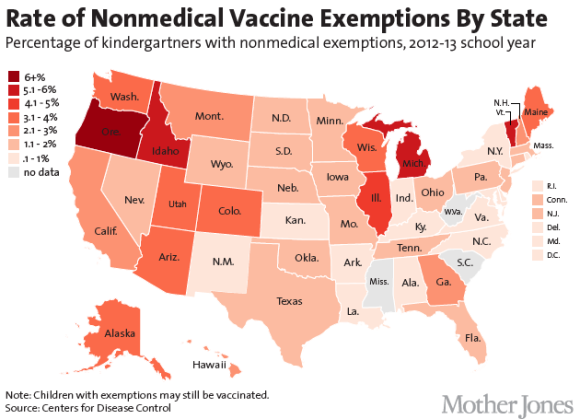Towards the end of his seminar, Dr. Offit outlines the ways in which media and scientific illiteracy can perpetuate a problem and, ultimately, harm science. This playlist shows what mechanisms are in place, and what we can do to take initiative and tackle them.
Broader Impacts: What’s Going On and What Can We DO About It?
- Explaining Cause and Effect
- Disillusionment About ‘Toxic’ Environment
- Politicizing Science
- Candy Apple Anecdote: You Can’t Take Away the Thought
- For Science’s Sake! What Happens with False Scientific Representation
Additionally, it’s important to address the vaccine exemptions which have been legislated, and how along with the anti-vaccine movement these have contributed to the outbreak of vaccine-preventable diseases. For instance, even though measles was declared officially eradicated in the U.S. in 2000, there have been several outbreaks in recent years (click here for more), including a record number of 667 cases in 2014 and a multi-state outbreak linked back to Disneyland in 2015. In Dr. Offit’s follow-up Q&A session, he addressed the importance of stressing the 14th Amendment (second clause) concerning vaccination exemptions, children’s rights, and parents rights (click here for more). Consider the following three types of exemptions which are allowed and vary state-by-state, and how they may be correlated with the recent disease outbreaks:
- Medical Exemptions
All 50 states allow children to be exempted from vaccination requirements for medical reasons. These reasons generally include the following situations:
- The child’s immune status is compromised by a permanent or temporary condition. For example, the child might have a congenital condition leading to an impaired immune system. Or, the child might take medications, such as chemotherapy or steroids, that impair the immune system. In either case, vaccination could be harmful to the child’s health.
- The child has a serious allergic reaction to a vaccine component.
- The child has had a prior serious adverse event related to vaccination.
2. Religious Exemptions
Forty-seven states allow exemptions to vaccination for religious reasons. Some states statutes indicate that to receive a religious exemption, a family must belong to a religious group with bona fide objections to vaccination. They may, as Iowa does, ask  a parent to attest that “immunization conflicts with a genuine and sincere religious belief and that the belief is in fact religious, and not based merely on philosophical, scientific, moral, personal, or medical opposition to immunizations.” Other states simply require that a parent sign a form stating that he or she has religious objections to vaccination.
a parent to attest that “immunization conflicts with a genuine and sincere religious belief and that the belief is in fact religious, and not based merely on philosophical, scientific, moral, personal, or medical opposition to immunizations.” Other states simply require that a parent sign a form stating that he or she has religious objections to vaccination.
Several legal cases involving the constitutionality of religious exemptions to vaccination have been tried. The rulings have in general upheld the right of states to mandate vaccination in spite of parents’ religious beliefs. At the same time, courts have often found that requiring parents belong to certain religious groups to qualify for religious exemptions violates the Constitution’s Equal Protection clause. The argument is that the Equal Protection clause should protect all people who claim a religious objection to vaccination, not only those who belong to a certain religion with recognized objections.
3. Personal Belief Exemptions
Twenty states allow exemptions to children whose parents have philosophical or personal belief objections to vaccination (Vermont and California will be removed from this list when legislation that eliminates the exemption goes into place in mid-2016). In most cases, parents must file a one-time or annual form with a school district attesting to a personal objection to vaccination. In states with all three types of exemptions, personal belief exemptions tend to be most common. And, in states that allow philosophical and personal exemptions from vaccination requirements, such exemptions increased from 0.99 to 2.45% between 1991 and 2004.
A Washington state law that took effect in July 2011 requires that parents seeking vaccination exemptions for their children discuss the benefits and risks of vaccination with a health care provider. The state allows medical, religious, and personal belief exemptions, and has an overall exemption rate of 5.2% in the 2014-15 school year. California and Oregon in recent years have enacted similar requirements.